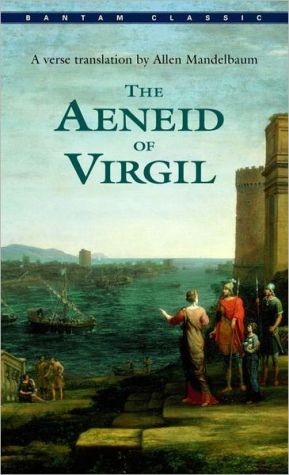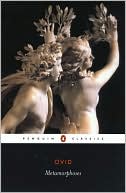The Aeneid of Virgil
"Written by the Roman poet Virgil more than two thousand years ago, the story of Aeneas' seven-year journey from the ruins of Troy to Italy, where he becomes the founding ancestor of Rome, is a narrative on an epic scale: Aeneas and his companions contend not only with human enemies but with the whim of the gods. His destiny preordained by Jupiter, Aeneas is nevertheless assailed by dangers invoked by the goddess Juno, and by the torments of love, loyalty, and despair. Virgil's supreme...
Search in google:
"A brilliant translation; the only one since Dryden which reads like English verse and conveys some of the majesty and pathos of the original."—Bernard M. W. Knox "Mandelbaum has . . . given us a contemporary experience of the masterpiece, at last."—David Ignatow "The book has a wonderful, detailed liveliness in every line."—Robert Fagles "Comes closer to the impossible goal of perfection than any of the numerous efforts that have poured out of American and British presses since World War II."—William S. AndersonBernard M. W. KnoxA brilliant translation; the only one since Dryden which reads like English verse and conveys some of the majesty and pathos of the original.
The Aeneid of Virgil\ \ By Virgil \ University of California Press\ Copyright © 1982 Virgil\ All right reserved. \ ISBN: 0520045505 \ \ \ \ Chapter One\ Book I\ I sing of arms and of a man: his fate had made him fugitive; he was the first\ to journey from the coasts of Troy as far\ as Italy and the Lavinian shores.\ Across the lands and waters he was battered 5\ beneath the violence of High Ones, for\ the savage Juno's unforgetting anger;\ and many sufferings were his in war-\ until he brought a city into being\ and carried in his gods to Latium; 10\ from this have come the Latin race, the lords\ of Alba, and the ramparts of high Rome.\ Tell me the reason, Muse: what was the wound\ to her divinity, so hurting her\ that she, the queen of gods, compelled a man 15\ remarkable for goodness to endure\ so many crises, meet so many trials?\ Can such resentment hold the minds of gods?\ There was an ancient city they called Carthage-\ a colony of refugees from Tyre- 20\ a city facing Italy, but far\ away from Tiber's mouth: extremely rich\ and, when it came to waging war, most fierce.\ This land was Juno's favorite-it is said-\ more dear than her own Samos; here she kept 25\ her chariot and armor; even then\ the goddess had this hope and tender plan:\ for Carthage to become the capital\ of nations, if the Fates would just consent.\ But she had heard that, from the blood of Troy, 30\ a race had come that some day would destroy\ the citadels of Tyre; from it, a people\ would spring, wide-ruling kings, men proud in battle\ and destined to annihilate her Libya.\ The Fates had so decreed. And Saturn's daughter- 35\ in fear of this, remembering the old war\ that she had long since carried on at Troy\ for her beloved Argos (and, indeed,\ the causes of her bitterness, her sharp\ and savage hurt, had not yet left her spirit; 40\ for deep within her mind lie stored the judgment\ of Paris and the wrong done to her scorned\ beauty, the breed she hated, and the honors\ that had been given ravished Ganymede)-\ was angered even more; for this, she kept 45\ far off from Latium the Trojan remnant\ left by the Greeks and pitiless Achilles.\ For long years they were cast across all waters,\ fate-driven, wandering from sea to sea.\ It was so hard to found the race of Rome. 50\ With Sicily scarce out of sight, the Trojans\ had gladly spread their canvas on the sea,\ turning the salt foam with their brazen prows,\ when Juno, holding fast within her heart\ the everlasting insult, asked herself: 55\ "Am I, defeated, simply to stop trying,\ unable to turn back the Trojan king\ from Italy? No doubt, the Fates won't have it.\ But Pallas-was she powerful enough\ to set the Argive fleet on fire, to drown 60\ the crewmen in the deep, for an outrage done\ by only one infuriated man,\ Ajax, Oileus' son? And she herself\ could fling Jove's racing lightning from the clouds\ and smash their galleys, sweep the sea with tempests. 65\ Then Ajax' breath was flame from his pierced chest;\ she caught him up within a whirlwind; she\ impaled him on a pointed rock. But I,\ the queen of gods, who stride along as both\ the sister and the wife of Jove, have warred 70\ so many years against a single nation.\ For after this, will anyone adore\ the majesty of Juno or, before\ her altars, pay her honor, pray to her?"\ Then-burning, pondering-the goddess reaches 75\ Aeolia, the motherland of storms,\ a womb that always teems with raving south winds.\ In his enormous cave King Aeolus\ restrains the wrestling winds, loud hurricanes;\ he tames and sways them with his chains and prison. 80\ They rage in indignation at their cages;\ the mountain answers with a mighty roar.\ Lord Aeolus sits in his high citadel;\ he holds his scepter, and he soothes their souls\ and calms their madness. Were it not for this, 85\ then surely they would carry off the sea\ and lands and steepest heaven, sweeping them\ across the emptiness. But fearing that,\ the all-able Father hid the winds within\ dark caverns, heaping over them high mountains; 90\ and he assigned to them a king who should,\ by Jove's sure edict, understand just when\ to jail and when, commanded, to set free.\ Then Juno, suppliant, appealed to him:\ "You, Aeolus-to whom the king of men 95\ and father of the gods has given this:\ to pacify the waves or, with the wind,\ to incite them-over the Tyrrhenian\ now sails my enemy, a race that carries\ the beaten household gods of Ilium 100\ to Italy. Hammer your winds to fury\ and ruin their swamped ships, or scatter them\ and fling their crews piecemeal across the seas.\ I have twice-seven nymphs with splendid bodies;\ the loveliest of them is Deiopea, 105\ and I shall join her to you in sure marriage\ and name her as your own, that she may spend\ all of her years with you, to make you father\ of fair sons. For such service, such return."\ And Aeolus replied: "O Queen, your task 110\ is to discover what you wish; and mine,\ to act at your command. For you have won\ this modest kingdom for me, and my scepter,\ and Jove's goodwill. You gave me leave to lean\ beside the banquets of the gods, and you 115\ have made me lord of tempests and of clouds."\ His words were done. He turned his lance head, struck\ the hollow mountain on its side. The winds,\ as in a column, hurry through the breach;\ they blow across the earth in a tornado. 120\ Together, Eurus, Notus, and-with tempest\ on tempest-Africus attack the sea;\ they churn the very bottom of the deep\ and roll vast breakers toward the beaches; cries\ of men, the creaking of the cables rise. 125\ Then, suddenly, the cloud banks snatch away\ the sky and daylight from the Trojans' eyes.\ Black night hangs on the waters, heavens thunder,\ and frequent lightning glitters in the air;\ everything intends quick death to men. 130\ At once Aeneas' limbs fall slack with chill.\ He groans and stretches both hands to the stars.\ He calls aloud: "O, three and four times blessed\ were those who died before their fathers' eyes\ beneath the walls of Troy. Strongest of all 135\ the Danaans, o Diomedes, why\ did your right hand not spill my lifeblood, why\ did I not fall upon the Ilian fields,\ there where ferocious Hector lies, pierced by\ Achilles' javelin, where the enormous 140\ Sarpedon now is still, and Simois\ has seized and sweeps beneath its waves so many\ helmets and shields and bodies of the brave!"\ * * *\ Aeneas hurled these words. The hurricane\ is howling from the north; it hammers full 145\ against his sails. The seas are heaved to heaven.\ The oars are cracked; the prow sheers off; the waves\ attack broadside; against his hull the swell\ now shatters in a heap, mountainous, steep.\ Some sailors hang upon a wave crest; others 150\ stare out at gaping waters, land that lies\ below the waters, surge that seethes with sand.\ And then the south wind snatches up three ships\ and spins their keels against the hidden rocks-\ those rocks that, rising in midsea, are called 155\ by the Italians "Altars"-like a monstrous\ spine stretched along the surface of the sea.\ Meanwhile the east wind wheels another three\ off from the deep and, terrible to see,\ against the shoals and shifting silt, against 160\ the shallows, girding them with mounds of sand.\ Before Aeneas' eyes a massive breaker\ smashes upon its stern the ship that carries\ the Lycian crewmen led by true Orontes.\ The helmsman is beaten down; he is whirled headlong. 165\ Three times at that same spot the waters twist\ and wheel the ship around until a swift\ whirlpool has swallowed it beneath the swell.\ And here and there upon the wide abyss,\ among the waves, are swimmers, weapons, planks, 170\ and Trojan treasure. Now the tempest takes\ the sturdy galleys of Ilioneus\ and brave Achates, now the ships of Abas\ and many-yeared Aletes; all receive\ their enemy, the sea, through loosened joints 175\ along their sides and through their gaping seams.\ But Neptune felt the fracas and the frenzy;\ and shaken by the unleashed winds, the wrenching\ of the still currents from the deep seabed,\ he raised his tranquil head above the surface. 180\ And he can see the galleys of Aeneas\ scattered across the waters, with the Trojans\ dismembered by the waves and fallen heavens.\ Her brother did not miss the craft and wrath\ of Juno. Catching that, he calls up both 185\ the east wind and the west. His words are these:\ "Has pride of birth made you so insolent?\ So, Winds, you dare to mingle sky and land,\ heave high such masses, without my command?\ Whom I-? But no, let me first calm the restless 190\ swell; you shall yet atone-another time-\ with different penalties for these your crimes.\ But now be off, and tell your king these things:\ that not to him, but me, has destiny\ allotted the dominion of the sea 195\ and my fierce trident. The enormous rocks\ are his-your home, East Wind. Let Aeolus\ be lord of all that lies within that hall\ and rule in that pent prison of the winds."\ So Neptune speaks and, quicker than his tongue, 200\ brings quiet to the swollen waters, sets\ the gathered clouds to flight, calls back the sun.\ Together, then, Cymothoe and Triton,\ thrusting, dislodge the ships from jagged crags.\ But now the god himself takes up his trident 205\ to lift the galleys, and he clears a channel\ across the vast sandbank. He stills the sea\ and glides along the waters on light wheels.\ And just as, often, when a crowd of people\ is rocked by a rebellion, and the rabble 210\ rage in their minds, and firebrands and stones\ fly fast-for fury finds its weapons-if,\ by chance, they see a man remarkable\ for righteousness and service, they are silent\ and stand attentively; and he controls 215\ their passion by his words and cools their spirits:\ so all the clamor of the sea subsided\ after the Father, gazing on the waters\ and riding under cloudless skies, had guided\ his horses, let his willing chariot run. 220\ And now Aeneas' weary crewmen hurry\ to find the nearest land along their way.\ They turn toward Libya's coast. There is a cove\ within a long, retiring bay; and there\ an island's jutting arms have formed a harbor 225\ where every breaker off the high sea shatters\ and parts into the shoreline's winding shelters.\ Along this side and that there towers, vast,\ a line of cliffs, each ending in like crags;\ beneath the ledges tranquil water lies 230\ silent and wide; the backdrop-glistening\ forests and, beetling from above, a black\ grove, thick with bristling shadows. Underneath\ the facing brow: a cave with hanging rocks,\ sweet waters, seats of living stone, the home 235\ of nymphs. And here no cable holds tired ships,\ no anchor grips them fast with curving bit.\ Aeneas shelters here with seven ships-\ all he can muster, all the storm has left.\ The Trojans, longing so to touch the land, 240\ now disembark to gain the wished-for sands.\ They stretch their salt-soaked limbs along the beach.\ Achates was the first to strike a spark\ from flint and catch the fire up with leaves.\ He spread dry fuel about, and then he waved 245\ the tinder into flame. Tired of their trials,\ the Trojan crewmen carry out the tools\ of Ceres and the sea-drenched corn of Ceres.\ And they prepare to parch the salvaged grain\ by fire and, next, to crush it under stone. 250\ Meanwhile Aeneas climbs a crag to seek\ a prospect far and wide across the deep,\ if he can only make out anything\ of Antheus and his Phrygian galleys, or\ of Capys, or the armor of Caicus 255\ on his high stern. There is no ship in sight;\ all he can see are three stags wandering\ along the shore, with whole herds following\ behind, a long line grazing through the valley.\ He halted, snatched his bow and racing arrows, 260\ the weapons carried by the true Achates.\ And first he lays the leaders low, their heads\ held high with tree-like antlers; then he drives\ the herds headlong into the leafy groves;\ they panic, like a rabble, at his arrows. 265\ He does not stay his hand until he stretches,\ victoriously, seven giant bodies\ along the ground, in number like his galleys.\ This done, he seeks the harbor and divides\ the meat among his comrades. And he shares 270\ the wine that had been stowed by kind Acestes\ in casks along the shores of Sicily:\ the wine that, like a hero, the Sicilian\ had given to the Trojans when they left.<\ Continues...\ \ Continues... \ \ \ \ Excerpted from The Aeneid of Virgil by Virgil Copyright © 1982 by Virgil. Excerpted by permission.\ All rights reserved. No part of this excerpt may be reproduced or reprinted without permission in writing from the publisher.\ Excerpts are provided by Dial-A-Book Inc. solely for the personal use of visitors to this web site. \ \
Introduction 1Map: The Voyages of Aeneas 42Virgil: The AeneidSafe Haven After Storm 47The Final Hours of Troy 74Landfalls, Ports of Call 103The Tragic Queen of Carthage 127Funeral Games for Anchises 153The Kingdom of the Dead 182Beachhead in Latium, Armies Gather 213The Shield of Aeneas 241Enemy at the Gates 266Captains Fight and Die 293Camilla's Finest Hour 324The Sword Decides All 355NotesTranslator's Postscript 387Genealogy: The Royal Houses of Greece and Troy 404Suggestions for Further Reading 406Variants from the Oxford Classical Text 410Notes on the Translation 411Pronouncing Glossary 424
\ Erich SegalAllen Mandelbaum has produced a living Aeneid, a version that is unmistakably poetry." -- The New York Times Book Review\ \ \ \ \ Bernard M. W. KnoxA brilliant translation; the only one since Dryden which reads like English verse and conveys some of the majesty and pathos of the original.\ \ \ David IgnatowMandelbaum has... given us a contemporary experience of the masterpiece, at last.\ \ \ \ \ The New YorkerFagles's new version of Virgil's epic delicately melds the stately rhythms of the original to a contemporary cadence. . . . He illuminates the poem's Homeric echoes while remaining faithful to Virgil's distinctive voice.\ \ \ \ \ The New York Times Book ReviewA new and noble standard bearer . . . There's a capriciousness to Fagles's line well suited to this vast story's ebb and flow.\ \ \ \ \ Library JournalAhl (classics & comparative literature, Cornell Univ.) has previously published translations of Seneca's and Lucan's works and has written books on Sophocles, Lucan, and Ovid. His new translation of this great Latin classic, Virgil's tale of Aeneas's seven-year journey from Troy to Italy, joins recent efforts by Stanley Lombardo (Hackett, 2005) and Robert Fagles (Penguin, 2006). Here, Ahl employs a version of Virgil's hexameter verse, in which the first syllable is accented. Unlike previous translators, he tries to capture some of Virgil's wordplay, puns, and anagrams, aiming to remain true to the original Latin. The overall results are accurate but not as fluent or vigorous as the translations by Lombardo and Fagles. While those translations remain the first choice for general readers interested mainly in The Aeneid's narrative aspects, Ahl's translation is good for those wanting a fuller sense of Virgil's language and poetic artistry. In addition to an indexed glossary of names, Ahl includes notes explaining references; classicist Elaine Fantham offers a substantial introduction discussing Virgil, Aeneas, and The Aeneid. Recommended for all public and academic libraries.\ —T.L. Cooksey\ \ \







